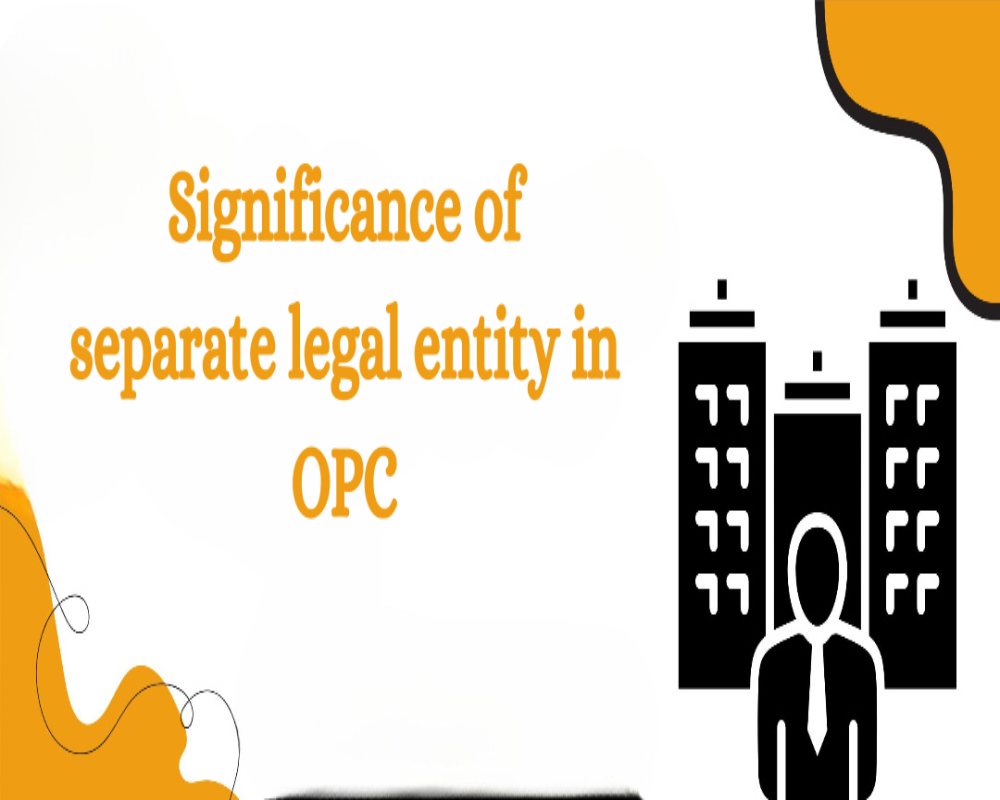Introduction
One of the most foundational principles of corporate law is the concept of a separate legal entity. This principle is central to all registered companies, including a One Person Company (OPC). Though an OPC is formed and operated by a single individual, it is still regarded as a distinct entity under the Companies Act, 2013. This legal separation between the company and its owner has profound implications on liability, ownership, legal recognition, and operational independence. This article explores the significance of the separate legal entity status in the context of OPCs.
Distinct Legal Existence
The moment an OPC is incorporated, it attains a separate legal existence apart from its sole member. This means the OPC has its own name, legal identity, and existence in the eyes of the law. It can enter into contracts, sue or be sued, and acquire assets in its own name, independently of the owner. This distinction is critical in positioning the business as a legitimate entity capable of functioning on its own.
Limited Liability Protection
One of the most significant advantages arising from separate legal identity is limited liability. The personal assets of the sole member are protected from the company’s debts and obligations. If the OPC incurs losses or defaults on its liabilities, only the assets owned by the company are at risk, not the individual’s personal wealth. This encourages entrepreneurship by reducing personal financial exposure.
Perpetual Succession
Separate legal entity status enables perpetual succession, meaning the company continues to exist even if the sole member dies or becomes incapacitated. In such cases, the nominee mentioned in the Memorandum of Association takes over ownership. The continuity of the company’s legal identity is maintained irrespective of changes in membership, ensuring stability for employees, creditors, and customers.
Ability to Own Property
An OPC can own, buy, or sell property in its own name. The property of the company does not belong to the member personally, even if the member is the only shareholder. This separation ensures that business assets are distinctly recognized and protected, and cannot be claimed as personal property in legal disputes involving the member.
Independent Contractual Capacity
Since an OPC is a separate legal entity, it can enter into contracts independently of its owner. This includes employment contracts, supplier agreements, service contracts, leases, and more. Such contracts are enforceable by or against the company, not the individual member, giving legal force to the company’s dealings.
Improved Business Credibility
Having a separate legal identity enhances the credibility of the OPC in the eyes of banks, financial institutions, suppliers, and clients. It gives the business a professional image, increasing the likelihood of obtaining loans, entering large contracts, and accessing government schemes. It distinguishes the OPC from informal or unregistered business setups.
Clear Separation of Ownership and Management
Even if the member and the director are the same person, the law treats the company and the individual separately. This distinction helps in maintaining transparent records, complying with statutory regulations, and avoiding the mixing of personal and business transactions. It also facilitates future conversion to a private limited company if the business grows.
Basis for Legal Accountability
As a separate legal entity, the OPC is legally accountable for its actions. It must maintain proper records, comply with filing obligations, and fulfill its tax responsibilities. This accountability strengthens regulatory oversight, prevents misuse of the corporate structure, and promotes a fair business environment.
Conclusion
The concept of a separate legal entity is a cornerstone of the One Person Company framework. It empowers individual entrepreneurs with the legal recognition and protections of a corporate entity while maintaining ownership control. From limited liability and business continuity to legal accountability and financial independence, this principle provides the OPC with a solid foundation for sustainable and responsible business growth. For small business owners looking for formalization with autonomy, the separate legal identity of an OPC is both a legal safeguard and a strategic advantage.
Hashtags
#OPC #SeparateLegalEntity #BusinessStructure #OnePersonCompany #LegalIdentity #Entrepreneurship #BusinessLaw #LimitedLiability #CorporateStructure #SmallBusiness #Startups #BusinessOwnership #LegalProtection #FinancialIndependence #CompanyFormation #BusinessGrowth #TaxBenefits #LiabilityProtection #BusinessSuccess #LegalFramework


0 Comments